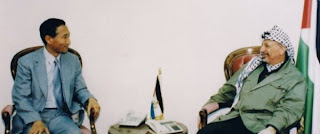 Read in Japanese (日本語)
Read in Japanese (日本語)
By Akio Matsumura
In December 1995 the World Assembly on Reconciliation was to be held at Jericho, hosted by Prime Minister Rabin and Chairman Arafat. A steering committee meeting I attended was held at Jericho in June, 1995. During our lunch break we went to see the Dead Sea. In case you haven’t been there, the Dead Sea is between Israel and the West Bank. It is the lowest point on the surface of the Earth on dry land and the water is 8.6 times saltier than the ocean. It was remarkable to see people reading their books while floating on the water. On the tour my friends also pointed out the Mount of Temptation where it is said Jesus was tempted by the Devil. We enjoyed our lunch and tour and returned to the afternoon session of our meeting. We kept moving to finish our agenda because I was scheduled to meet with Chairman Arafat at 9 PM that evening in Gaza.
During the afternoon, while finishing our agenda, we received an emergency phone call informing us that a suicide bomb had exploded on a public bus in Tel Aviv. There were more than 25 deaths, one of the largest death tolls in many years. The accident closed the border between Israel and Gaza—no car, diplomatic or not, was allowed to cross the border.
Immediately I rushed to the office of the United Nations Development Programme (UNDP) in Palestine to meet with the representative, Mr. Wate.… Continue reading


